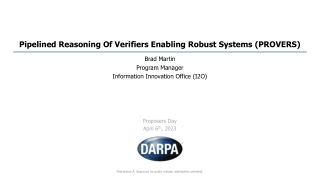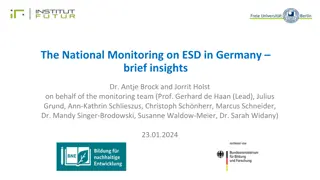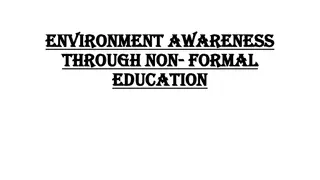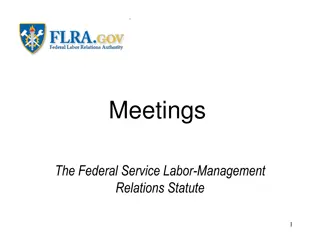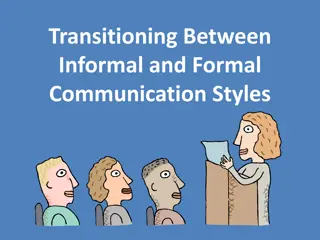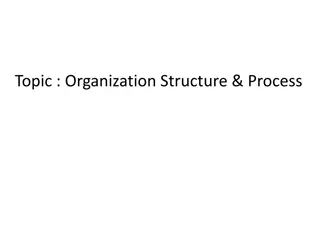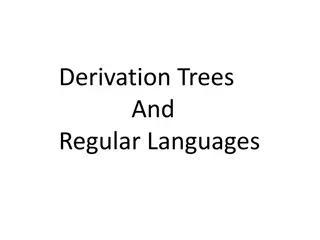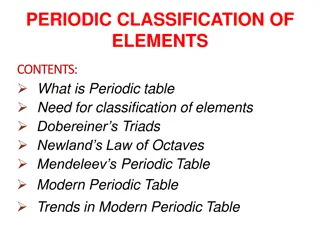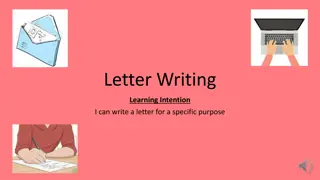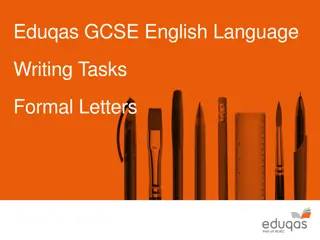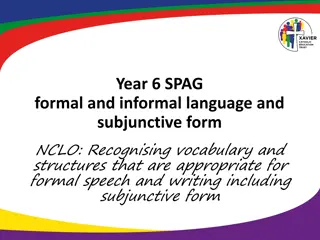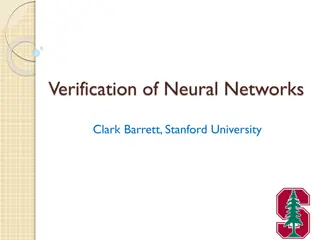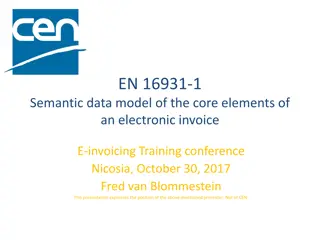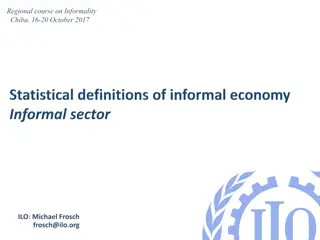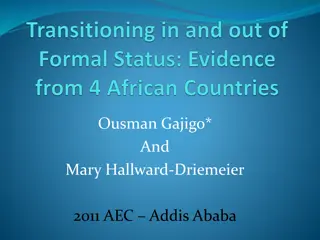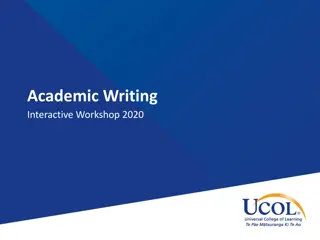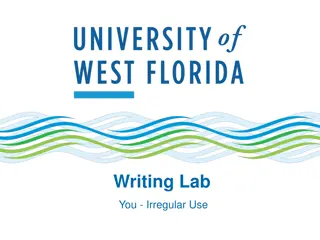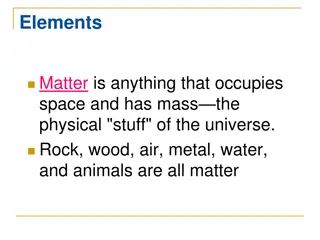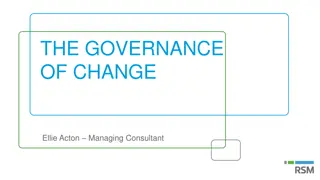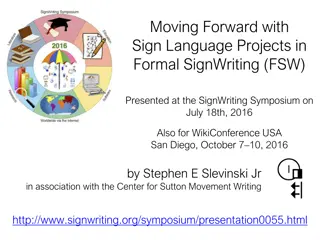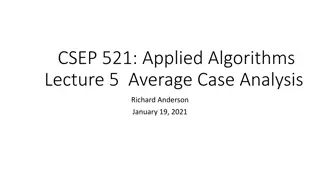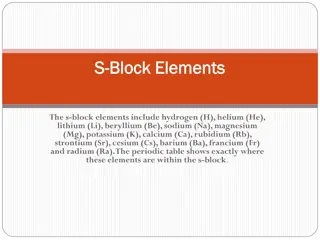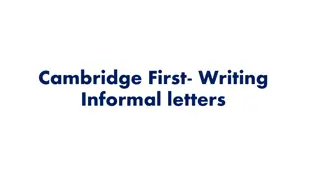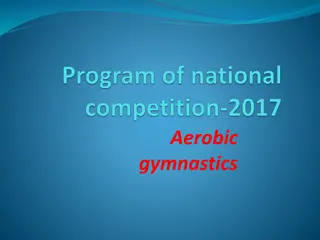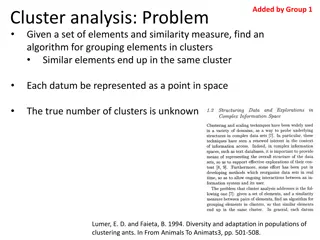Sustainable Fashion Solutions for Repurposing Formal Wear
Transforming formal wear from single-use items into sustainable fashion solutions is vital for reducing textile waste and environmental impact. This article explores the challenges of post-party formal dresses, the environmental consequences of textile waste, and innovative approaches to upcycling d
9 views • 14 slides
The Semantic Argument for the Existence of God - International Conference Insights
Explore the Semantic Argument and its implications for the existence of God as presented by Emanuel Rutten at the International Proofs of God's Existence Conference. The lecture delves into universal properties, formal versus non-formal properties, and the likelihood of God's existence based on thes
0 views • 14 slides
Pipelined Reasoning Of Verifiers Enabling Robust Systems (PROVERS)
The PROVERS program aims to develop automated formal methods tools integrated into software development pipelines to enable the incremental production and maintenance of high-assurance national security systems. Addressing DoD challenges and vulnerabilities in weapon systems, the initiative emphasiz
3 views • 25 slides
Mastering Formal Letter Writing in Education
Enhance your formal letter writing skills in education with a focus on job applications and key features of formal correspondence. Explore the purposes of writing letters and learn to choose the appropriate writing style for each type. Practice completing expressions for formal letters effectively.
5 views • 27 slides
Principles of Education: Understanding the Meaning and Concepts
Education plays a vital role in shaping individuals and societies, fostering confidence, hope, and positive change. It encompasses a broad spectrum from imparting knowledge to personal growth and lifelong development. The etymological roots of education reflect concepts of discipline and knowledge.
5 views • 6 slides
Insights into the National Monitoring on ESD in Germany
Dr. Antje Brock and Jorrit Holst, on behalf of the monitoring team, provide insights into the National Monitoring on ESD in Germany. The monitoring aims to capture the quantity and quality of ESD in formal and non-formal learning settings, offering instruments for evaluation and contributing to the
7 views • 10 slides
Understanding the Periodic Table and Chemical Bonds in Physical Science
The periodic table organizes elements based on their properties, with rows representing periods and columns representing groups. Mendeleev's early table laid the foundation for predicting undiscovered elements. Today's periodic table orders elements by atomic number, showcasing the periodic law and
3 views • 15 slides
Governance and Managerial Leadership of Formal Social Protection in Africa: Insights from Cameroon's National Social Insurance Fund (CNPS)
This presentation delves into the governance and managerial leadership of formal social protection in Africa, focusing on Cameroon's CNPS system. It discusses the institutional evolution of social protection, the challenges faced by bureaucratic and political stakeholders, and the roles of various s
0 views • 8 slides
Enhancing Environmental Awareness Through Non-Formal Education Initiatives
Non-formal education plays a crucial role in enhancing environmental awareness through programs such as eco-clubs, population education initiatives, and the National Green Corps. These initiatives aim to educate individuals, especially children, about environmental issues, leading to better decision
0 views • 7 slides
Understanding Formality in Meetings under the Federal Service Labor-Management Relations Statute
The Federal Service Labor-Management Relations Statute provides guidelines for formal discussions and investigative examinations in the context of labor relations. It outlines the rights of unions to representation in formal meetings, emphasizing the importance of subject matter and formality. The d
0 views • 34 slides
Mastering Communication Styles: Informal vs. Formal
Explore the nuances of transitioning between informal and formal communication styles, understand the components of different forms of communication, and learn when to apply each style in appropriate situations. Delve into the characteristics and examples of informal and formal communication, and di
0 views • 18 slides
Understanding Discourse Analysis: Formal Links and Contextual Connections
Discourse analysis involves examining language beyond grammar rules, focusing on formal links within sentences and contextual connections outside of language. Guy Cook discusses how formal features shape discourse meaning and how verb forms influence sentence coherence. The use of parallelism in spe
3 views • 22 slides
Understanding Organization Structure and Process
Organization structure is the formal arrangement of relationships within a firm, important for achieving objectives efficiently. It involves elements like job differentiation, integration, authority systems, and flow of information. The formal and informal organizational structures play distinct rol
5 views • 62 slides
Understanding Formal and Informal Writing Styles: A Guide for Year 5 Students
Explore the concepts of formal and informal writing styles through engaging activities and examples in this educational resource tailored for Year 5 English students. Learn to distinguish between the two styles, understand the criteria for each, and practice transforming sentences from informal to f
1 views • 18 slides
Understanding Derivation Trees and Regular Languages in Formal Language Theory
Derivation trees play a crucial role in formal language theory, aiding in visualizing the process of deriving strings from a formal grammar. The concept of leftmost and rightmost derivations, along with their respective tree representations, provide insights into how strings are generated using gram
1 views • 15 slides
Evolution of Periodic Table and Classification of Elements
The Periodic Table is a systematic arrangement of elements based on atomic number and properties. Over time, chemists developed various classification methods such as Dobereiner's Triads, Newland's Law of Octaves, Mendeleev's Periodic Table, and the Modern Periodic Table to organize the increasing n
1 views • 26 slides
Learning to Write a Formal Letter of Complaint
Explore the process of writing a formal letter of complaint with the help of visual aids and an example scenario. Learn about the structure and key components of such letters, including addressing the issue, expressing concerns, and requesting resolution. Enhance your letter-writing skills by unders
2 views • 15 slides
Mastering Formal Letter Writing: Tips and Examples for Success
Explore the art of formal letter writing with this comprehensive presentation covering the fundamentals of planning, content, features, and layout. Learn how to address the audience, define the purpose, structure your letter effectively, and craft the right tone. Discover essential tips for opening
0 views • 22 slides
D-Block Elements: Properties and Classification in Chemistry
Welcome to the Department of Chemistry at Kisan Veer Mahavidyalaya, Wai. Explore the Chemistry of Elements of the 3d series, focusing on d-Block Elements and Transition Elements. Learn about their electronic structure, colored ions, magnetic properties, oxidation states, and complex formation. Under
0 views • 34 slides
Understanding Formal Invitation Card Etiquette
Formal invitations play a significant role in conveying important event details and setting the tone for the occasion. They provide complete information including the occasion, names of hosts and invitees, date, time, venue, and more. The format of formal invitations follows specific guidelines, usi
0 views • 16 slides
Exploring Orto-Computing: Bridging the Gap Between Formal and Phenomenological Computing
Meaningful experiments suggest a transition from the formal, Turing-based approach to a structural-phenomenological one called Orto-Computing. This innovative concept integrates mind-matter interaction and non-formal functions within computational systems, offering potential solutions to complexity
0 views • 18 slides
Understanding Formal and Informal Language with Subjunctive Form
Explore the distinctions between formal and informal language, along with the appropriate usage of the subjunctive form. Learn how to enhance your writing by identifying key vocabulary and structures for formal speech and writing. Get insights on recognizing and utilizing formal language in various
0 views • 9 slides
Software Bugs and Formal Verification in Critical Systems
Software bugs have caused catastrophic events like radiation overdoses and rocket explosions, emphasizing the importance of formal verification in ensuring software correctness. Formal verification uses mathematical models to prove software correctness, offering higher assurance, especially in safet
1 views • 26 slides
Challenges and Policies in Formalising Women Workers in India
The Indian labor market faces significant challenges in formalizing women workers, with a noticeable decline in women's employment especially in rural areas. Despite recent policy attempts at formalization, such as the Unorganized Workers Social Security Act 2008 and the Maternity Benefits Act, wome
0 views • 19 slides
Formal Verification of Cyberphysical Systems and Future Certification Methods
Explore the formal verification techniques and tools used in cyberphysical systems, including KeYMaera verification tool, applications in distributed car control and adaptive cruise control, and the formal verification of ACC algorithms. The future work section highlights considerations for sensor d
0 views • 17 slides
Semantic Data Model of Electronic Invoicing Core Elements
Presentation by Fred van Blommestein on the EN16931-1 semantic data model of core elements in electronic invoicing, covering invoice processes, core invoice design, semantic model details, business rules, and invoicing principles. The model includes 160 elements in 33 groups, with mandatory elements
0 views • 13 slides
Understanding the Transition to Formal Economy: Concepts and Recommendations
The concept of the informal economy, formal arrangements, and the distinction between informal sector and informal employment are explained in detail. Recommendations and resolutions from ILO concerning the transition from informal to formal economy, statistical guidelines, and definitions are highl
0 views • 26 slides
Determinants of Formality and Informality in African Firms
This research explores the factors influencing the formal registration of firms in African countries and the impact of transitioning between formal and informal sectors. It delves into the effects on firm performance, access to infrastructure and finance, tax revenue, and worker welfare. The study a
0 views • 20 slides
Academic Writing Interactive Workshop 2020
Explore the essentials of academic writing through this interactive workshop. Discover the key elements such as paraphrasing, formal language, and critical thinking. Learn how to effectively paraphrase ideas with citations, follow steps to enhance your paraphrasing skills, and engage in practical ac
0 views • 22 slides
Effective Use of "You" in Writing: Informal vs. Formal Guidelines
Understanding the usage of the second-person pronoun "you" in writing is essential for clear communication. In informal settings, "you" is used broadly to address readers directly or as an indefinite pronoun. However, in formal writing, it's crucial to avoid potential reader bias by using alternativ
0 views • 4 slides
Exploring the World of Matter and Elements
Matter is the physical "stuff" of the universe, encompassing elements that make up rocks, wood, air, metals, water, and living organisms. Chemical elements are the building blocks of matter, with essential elements like oxygen, carbon, hydrogen, and nitrogen constituting a significant part of living
0 views • 24 slides
Understanding the Importance of Formal Governance in Project Management
Formal governance in project management is crucial for ensuring robust decision-making, optimizing project portfolios, improving relationships with stakeholders, minimizing risks, and maximizing benefits. By adopting a formal approach to governance, organizations can enhance project and program perf
0 views • 14 slides
Exploring Formal SignWriting in Sign Language Projects
Delve into the world of Formal SignWriting (FSW) as presented at the SignWriting Symposium in 2016 by Stephen E. Slevinski Jr. Discover how FSW, supported by the Center for Sutton Movement Writing, offers a formal language system for sign languages with stable standards and diverse implementations.
0 views • 29 slides
Guidelines for Writing Effective Formal Letters
Learn about the types of formal letters, elements of a successful letter, paragraph planning tips, and the style to use in formal letters. Understand how to structure letters of complaint effectively, including the importance of clarity, justification, and clear presentation of complaints and sugges
0 views • 15 slides
Understanding Average Case Analysis of Algorithms
Explore the average case performance of algorithms, focusing on topics like stable marriage, the coupon collector problem, and formal settings for random inputs. Learn about stable matching scenarios, formal notions, and examples illustrating the concepts. Discover the formal problem of matching pre
0 views • 29 slides
Understanding S-Block Elements in the Periodic Table
The s-block elements in the Periodic Table consist of 14 elements with unique properties and characteristics. Lithium, sodium, and potassium are notable members of Group 1, characterized by their reactivity and ability to form alkaline solutions when in contact with water. These soft metals exhibit
0 views • 23 slides
Comprehensive Overview of Peace Processes and the Role of Women and Girls
Peace processes involve a variety of formal and informal activities, with the participation of different actors such as international organizations, grassroots movements, and individuals. Formal peace processes include conflict prevention, peace-building, and disarmament, while informal activities e
0 views • 12 slides
Mastering the Art of Writing Informal and Formal Letters
Explore the nuances of writing informal and formal letters, covering various types of letters, essential components, stylistic differences, and examples of formal versus informal expressions. Learn how to craft engaging letters for different purposes with appropriate greetings, introductions, main b
0 views • 6 slides
Aerobic Gymnastics Competition Guidelines and Rules
The guidelines for aerobic gymnastics competitions include compulsory elements, categories, competition spaces, deductions, and specific rules for different age groups. The competitions have specific parameters for elements allowed, lifting, floor elements, music length, maximum difficulty elements,
0 views • 17 slides
Cluster Analysis: Grouping Elements into Clusters with Similarity Measures
Given a set of elements and a similarity measure, the algorithm aims to group elements into clusters where similar elements are grouped together. Each element is represented as a point in space, and the true number of clusters is unknown. The clustering algorithm is inspired by the behavior of ants
0 views • 15 slides


